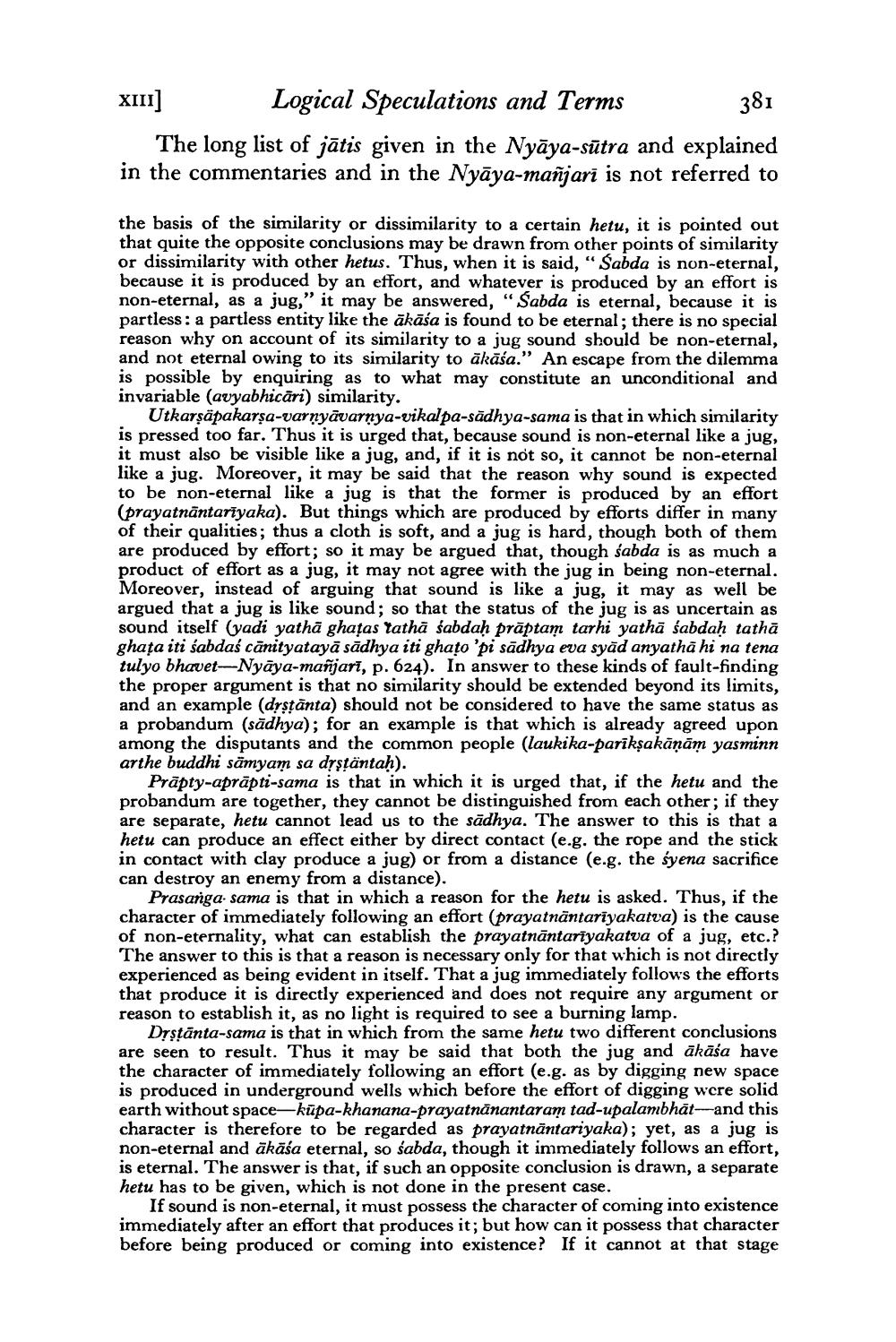________________
XI11] Logical Speculations and Terms 381
The long list of jātis given in the Nyāya-sūtra and explained in the commentaries and in the Nyāya-mañjarī is not referred to
the basis of the similarity or dissimilarity to a certain hetu, it is pointed out that quite the opposite conclusions may be drawn from other points of similarity or dissimilarity with other hetus. Thus, when it is said, “ Sabda is non-eternal, because it is produced by an effort, and whatever is produced by an effort is non-eternal, as a jug," it may be answered, “Sabda is eternal, because it is partless: a partless entity like the ākāśa is found to be eternal; there is no special reason why on account of its similarity to a jug sound should be non-eternal, and not eternal owing to its similarity to ākāśa." An escape from the dilemma is possible by enquiring as to what may constitute an unconditional and invariable (avyabhicări) similarity.
Utkarşäpakarşa-varnyāvarnya-vikalpa-sādhya-sama is that in which similarity is pressed too far. Thus it is urged that, because sound is non-eternal like a jug, it must also be visible like a jug, and, if it is not so, it cannot be non-eternal like a jug. Moreover, it may be said that the reason why sound is expected to be non-eternal like a jug is that the former is produced by an effort (prayatnāntarīyaka). But things which are produced by efforts differ in many of their qualities; thus a cloth is soft, and a jug is hard, though both of them are produced by effort; so it may be argued that, though sabda is as much a product of effort as a jug, it may not agree with the jug in being non-eternal. Moreover, instead of arguing that sound is like a jug, it may as well be argued that a jug is like sound; so that the status of the jug is as uncertain as sound itself (yadi yathā ghatas tathā sabdaḥ prāptam tarhi yathā sabdah tathā ghața iti sabdaś canityatayā sādhya iti ghato 'pi sādhya eva syād anyathā hi na tena tulyo bhavet-Nyāya-mañjari, p. 624). In answer to these kinds of fault-finding the proper argument is that no similarity should be extended beyond its limits, and an example (drstānta) should not be considered to have the same status as a probandum (sādhya); for an example is that which is already agreed upon among the disputants and the common people (laukika-pariksakāņām yasminn arthe buddhi sämyam sa drşțäntah).
Prāpty-aprāpti-sama is that in which it is urged that, if the hetu and the probandum are together, they cannot be distinguished from each other; if they are separate, hetu cannot lead us to the sādhya. The answer to this is that a hetu can produce an effect either by direct contact (e.g. the rope and the stick in contact with clay produce a jug) or from a distance (e.g. the syena sacrifice can destroy an enemy from a distance).
Prasanga sama is that in which a reason for the hetu is asked. Thus, if the character of immediately following an effort (prayatnāntarīyakatva) is the cause of non-eternality, what can establish the prayatnāntarīyakatva of a jug, etc.?
The answer to this is that a reason is necessary only for that which is not directly experienced as being evident in itself. That a jug immediately follows the efforts that produce it is directly experienced and does not require any argument or reason to establish it, as no light is required to see a burning lamp.
Drştānta-sama is that in which from the same hetu two different conclusions are seen to result. Thus it may be said that both the jug and ākāśa have the character of immediately following an effort (e.g. as by digging new space is produced in underground wells which before the effort of digging were solid earth without space-kūpa-khanana-prayatnānantaram tad-upalambhāt-and this character is therefore to be regarded as prayatnāntariyaka); yet, as a jug is non-eternal and ākāśa eternal, so sabda, though it immediately follows an effort, is eternal. The answer is that, if such an opposite conclusion is drawn, a separate hetu has to be given, which is not done in the present case.
If sound is non-eternal, it must possess the character of coming into existence immediately after an effort that produces it; but how can it possess that character before being produced or coming into existence? If it cannot at that stage




